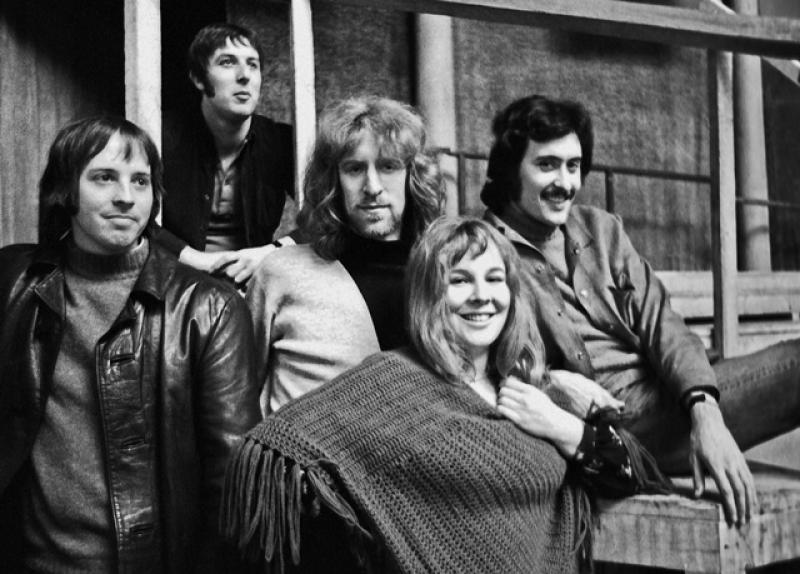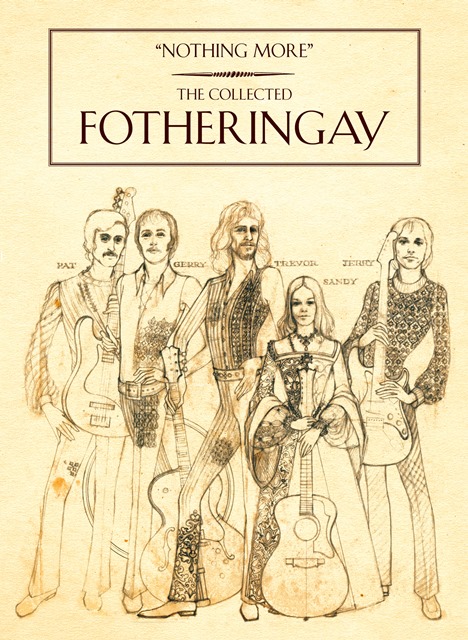Reissue CDs Weekly: Fotheringay | reviews, news & interviews
Reissue CDs Weekly: Fotheringay
Reissue CDs Weekly: Fotheringay
The great and the lacklustre rub shoulders on what Sandy Denny did between Fairport Convention and the solo years

 Fotheringay: Nothing More – The Collected Fotheringay
Fotheringay: Nothing More – The Collected Fotheringay
Coming to the sole Fotheringay album cold undermines received opinion it was a side issue in Sandy Denny’s career: a stepping-stone between leaving Fairport Convention and going solo. The band’s eponymous 1970 album opens with “Nothing More” and “The Sea”, two absolutely fantastic Denny songs performed with affecting and brooding sensitivity. Then the album shifts gear. “The Ballad of Ned Kelly”, written and sung by her partner Trevor Lucas, is a dreary re-write of Dylan’s “You Ain’t Going Nowhere”. Anyone influenced by The Band could have assembled this by-numbers rootsiness. The spell cast by the first two songs has been broken.
It’s quickly clear Fotheringay, issued in June 1970, showcases one voice worth hearing. Denny’s. On a different album “The Ballad of Ned Kelly” and a version of Dylan’s “Too Much of Nothing” would make sense, but here they destroy the mood – as does the somewhat uncomfortable Denny/Lucas composition “Peace in the End”. Much of Fotheringay is great – toweringly so – but it's a hodgepodge. Nonetheless, notwithstanding the filler, this is an essential album.
Nothing More – The Collected Fotheringay is more than the Fotheringay album. The case-bound set includes four discs: three CDs, a DVD and a splendid book. Fotheringay is heard on Disc One and bolstered with six alternate takes and demos. The band’s late-1970 and then-unreleased second album (first issued in 2008) is collected on Disc Two. The bonuses are different mixes, rehearsal tracks and two superfluous versions created in the studio in 2004 and 2015. Disc Three is a live concert and previously unreleased BBC sessions. The DVD is of four songs filmed for German TV.
 The DVD foregrounds the disconnects inherent in Fotheringay. Denny’s (pictured left, in 1970) opening “John the Gun” – later recorded solo – is superb and spine-tingling. The closing “Too Much of Nothing” is just-about short of alright. In this rendering, it is not just the material selected for performance which does not cohere. Jerry Donahue’s guitar sits above the songs rather than serving them. Gerry Conway’s drumming is cluttered and distracting. Fotheringay had formed in early 1970 but had not yet gelled by this November 1970 performance. The announcement of the band’s split was made in January 1971.
The DVD foregrounds the disconnects inherent in Fotheringay. Denny’s (pictured left, in 1970) opening “John the Gun” – later recorded solo – is superb and spine-tingling. The closing “Too Much of Nothing” is just-about short of alright. In this rendering, it is not just the material selected for performance which does not cohere. Jerry Donahue’s guitar sits above the songs rather than serving them. Gerry Conway’s drumming is cluttered and distracting. Fotheringay had formed in early 1970 but had not yet gelled by this November 1970 performance. The announcement of the band’s split was made in January 1971.
Impressions Fotheringay never gelled are reinforced by the June 1970 Rotterdam concert heard on Disc Three. Again, the guitar is too far to the fore and the drumming over-busy, but at least the band sound urgent and vital. The opening version of Gordon Lightfoot’s “The Way I Feel” (also heard on Fotheringay) works better than its tentative studio counterpart, but reveals the debt to Fairport Convention’s treatments of similar material. “The Sea” is followed by a clumping “Too Much of Nothing”. The live set ends with an utterly awful run through of Chuck Berry’s “Memphis Tennessee” which is preceded by Denny laughing apologetically. It beggars belief Fotheringay were doing silly cover versions the month of their album’s release. They manifestly could have been a very fine band – Denny’s band. But they were not permitting themselves to be so.
The unreleased album heard on Disc Two is similarly scrappy – Denny’s vocals were not final versions, but guide takes. The version of old chestnut “Wild Mountain Thyme” is exquisitely crystalline. But the Lucas-sung “Knights of the Road” is a weak country-rock chug which could pass for an album track by pub rockers Brinsley Schwarz.
After reading the enlightening accompanying book, by Denny biographer Mick Houghton, it’s obvious the band were subject to much push and pull. Denny wanted to showcase Lucas. There was pressure on her to go solo. The story of her leaving Fairport Convention remains confused and confusing. So does the tale of how Fotheringay foundered.
Obviously, Nothing More – The Collected Fotheringay frustrates. It includes some definitive performances of astonishing songs written and sung by an artist totally in tune with their muse. For that alone this a must-have. Listen in the order everything is presented. Then watch the DVD and be bowled over by “Nothing More” and “John the Gun”. After that, return visits will, inevitably, be on a track-by-track basis. Fotheringay were magnificent. But only when they allowed Denny to shine.
Explore topics
Share this article
The future of Arts Journalism
You can stop theartsdesk.com closing!
We urgently need financing to survive. Our fundraising drive has thus far raised £33,000 but we need to reach £100,000 or we will be forced to close. Please contribute here: https://gofund.me/c3f6033d
And if you can forward this information to anyone who might assist, we’d be grateful.

Subscribe to theartsdesk.com
Thank you for continuing to read our work on theartsdesk.com. For unlimited access to every article in its entirety, including our archive of more than 15,000 pieces, we're asking for £5 per month or £40 per year. We feel it's a very good deal, and hope you do too.
To take a subscription now simply click here.
And if you're looking for that extra gift for a friend or family member, why not treat them to a theartsdesk.com gift subscription?
more New music
 Album: Will Smith - Based on a True Story
Big Willie’s back - but maybe he should’ve stayed home
Album: Will Smith - Based on a True Story
Big Willie’s back - but maybe he should’ve stayed home
 Album: Perfume Genius - Glory
Album seven from an artist carving out his own space in the most modernist of ways
Album: Perfume Genius - Glory
Album seven from an artist carving out his own space in the most modernist of ways
 Album: Alison Krauss & Union Station - Arcadia
Their first album in 14 years looks hard at the past, and its role in the present
Album: Alison Krauss & Union Station - Arcadia
Their first album in 14 years looks hard at the past, and its role in the present
 Lauren Mayberry, Barrowland, Glasgow review - solo star stays too close to the day job
The Chvrches singer mixed some great tunes with an overly heavy sound.
Lauren Mayberry, Barrowland, Glasgow review - solo star stays too close to the day job
The Chvrches singer mixed some great tunes with an overly heavy sound.
 Album: Toria Wooff - Toria Wooff
Assured but too measured debut album from Americana-inclined singer-songwriter
Album: Toria Wooff - Toria Wooff
Assured but too measured debut album from Americana-inclined singer-songwriter
 Music Reissues Weekly: Too Far Out - Beat, Mod & R&B From 304 Holloway Road 1963-1966
Maverick producer Joe Meek’s maximum-impact approach to the beat-group scene
Music Reissues Weekly: Too Far Out - Beat, Mod & R&B From 304 Holloway Road 1963-1966
Maverick producer Joe Meek’s maximum-impact approach to the beat-group scene
 Album: Selena Gomez and Benny Blanco - I Said I Love You First
An album by a pair of loved-up Hollywood celebs that is, whisper it, rather good
Album: Selena Gomez and Benny Blanco - I Said I Love You First
An album by a pair of loved-up Hollywood celebs that is, whisper it, rather good
 Album: The Horrors - Night Life
A new line-up proves no hindrance to a band bringing electro-rock zip to the darkness
Album: The Horrors - Night Life
A new line-up proves no hindrance to a band bringing electro-rock zip to the darkness
 Mercury Rev, Islington Assembly Hall review - the august US psychedelic explorers cover all bases
Balance is maintained between the anticipated and the spontaneous
Mercury Rev, Islington Assembly Hall review - the august US psychedelic explorers cover all bases
Balance is maintained between the anticipated and the spontaneous
 Lizz Wright, Barbican review - sweet inspiration
Soul, jazz and gospel seamlessly mixed
Lizz Wright, Barbican review - sweet inspiration
Soul, jazz and gospel seamlessly mixed
 Album: Billy Hart Quartet - Just
The drum legend's group in perfect balance
Album: Billy Hart Quartet - Just
The drum legend's group in perfect balance
 Wardruna, Symphony Hall, Birmingham review - Einar Selvik's Norsemen return to Mercia in triumph
Operatic neo-pagans’ magnificent show is an uplifting call for unity
Wardruna, Symphony Hall, Birmingham review - Einar Selvik's Norsemen return to Mercia in triumph
Operatic neo-pagans’ magnificent show is an uplifting call for unity

Add comment